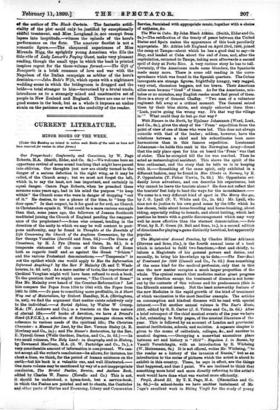CURRENT LITERATURE.
MINOR BOOKS OF THE WEEK.
(Under this Heading we intend to notice such Books of the week as hays not been reserved for review in other forms.] Our Prayer-book: Conformity and Conscience, by W. Page Roberts, M.A. (Smith, Elder, and Co. 6s.)—We welcome here an opportune revival of some sound teaching that might have passed into oblivion. Our thoughts just now are chiefly turned to the danger of a serious defection in the right wing, as it may be called, of the Church army ; but we must not forget the left, which is, to say the least, not less important, and certainly in equal danger. Canon Page Roberts, when he preached these sermons some years ago, bad in his mind the purpose "to keep within" the Church some who were in danger of dropping " out of it." He desires, to use a phrase of the time, to "keep the door open." In that respect, be it for good or for evil, no Church in Christendom equals it. What could be a more curious example than that, some years ago, the followers of Joanna Southcott meditated joining the Church of England pending the reappear- ance of the prophetess?—Some wise counsel, tending in the direction of the unity to which we may be well content to post- pone uniformity, may be found in Thoughts at the Eventide of Life Concerning the Church of the Anglican Communion, by the Rev George Venables (Jerrold and Sons, 6d.)—The Course of Conscience, by H. J. Pye (Burns and Oates, 2s. 6d.), is a temperate statement of the case of the Church of Rome both as regards itself and as against the Greek " Schism" and the various Protestant denominations.—" Temperate" is not the epithet which one would apply to Has the Reformation Reformed Anything ? by the Rev F Melechy (R. and T. Wash- bourne, is. 6d. net). As a mere matter of taste, the imprimatur of Cardinal Vaughan might well have been refused to such a book. To the question itself we might answer, " The Church of Rome." Has Mr. Malachy ever heard of the Counter-Reformation ? Let him compare the Popes from 1584 to 1644 with the Popes from 1431 to 1534.—fo pass to something more profitable, in A Short Way out of Materialism, by Hubert Handley, M.A. (Rivingtons, ls. net), we find the argument that matter exists relatively only to the individual.—A Buried Sphinx, by Walter W Crump, M.A. (W. Andrews and Co.), is a tractate on the true nature of eternal life.—Of books of devotion, we have A Friend's Hand (S.P.C.K.), a selection of Scripture passages chosen with reference to various needs of the spiritual life; The Christian Character : a Manual for Lent, by the Rev. Vernon Staley (A. R. Mowbray and Co., ls.) ; and The Sinner's Restoration, by the Rev. E. Tyrrell Green (Wells Gardner, Darton, and Co., 2s. 6d.)—In two small volumes, The Holy Land : in Geography and in History, by Townsend MacConn, M.A. (S. W. Partridge and Co., 7s.), a very considerable amount of information is compressed. We can- not accept all the writer's conclusions—he allows, for instance, too short a time, we think, for the period of human existence on the earth—but his book is a valuable one, and well illustrated.— One more volume may be mentioned by way of a not inappropriate conclusion, The Bristol Psalter, Service, and Anthem Book, edited by Charles W. Pearce (Novello and Co.) This is not, it should be understood, a hymn-book, but a service-book, in which the Psalms are pointed and set to chants, the Canticles and other parts of Matins and Evensong, Litany and Communion Service, furnished with appropriate music, together with a ehoice of anthems, &c.






































 Previous page
Previous page